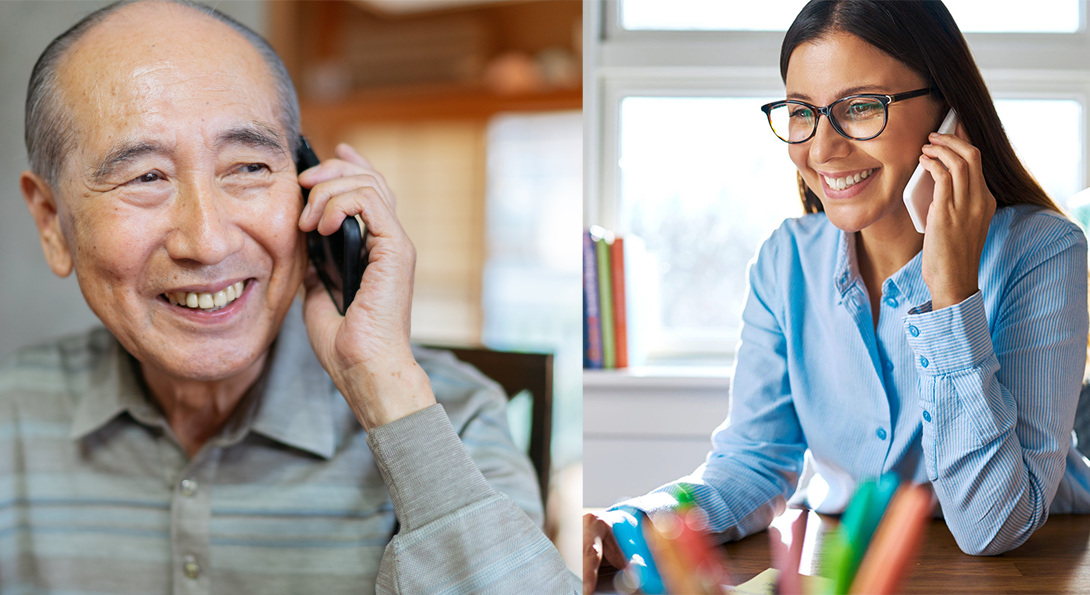UIC College of Pharmacy and College of Medicine teach students how to be “Good Neighbors”

The 21st Century Good Neighbor Program helps mitigate social isolation in older adults
The Centers for Disease Control and Prevention state that loneliness and social isolation in older adults is “a serious public health risk affecting a significant number of people in the United States and putting them at risk for dementia and other serious medical conditions.”
Reports from the National Academies of Sciences, Engineering, and Medicine (NASEM) reveal that more than one-third of adults aged 45 and older feel lonely, and nearly one-fourth of adults aged 65 and older are socially isolated. Living alone, the loss of family or friends, chronic illness, and hearing loss are all contributing factors to social isolation in older adults.
With these harrowing facts in mind, the 21st Century Good Neighbor Program was born – a collaboration between the UIC College of Pharmacy (Rockford), the UIC College of Medicine (Rockford) and the UIC College of Medicine (Chicago). The colleges are in partnership with Lifescape, northwest Illinois’ top resource for supporting and empowering older adults. Their mission “to promote independent living and enhance the quality of life for individuals by providing affordable nutrition and other services, with an emphasis on the aging population” aligned well with the goals of the 21st Century Good Neighbor Program, making them the perfect partners for this project.
“As healthcare professionals, we know that social isolation is an issue for many elders, so we developed a program that would address their needs,” said Dr. Linda Chang, PharmD ’97, Associate Professor of Clinical Family Medicine at UIC College of Medicine. Once COVID-19 arose, preventing people from spending time with their loved ones in person, their work became even more crucial.
The program consists of 250 student volunteers who are either pre-health students, pharmacy students, or medical students at UIC. These student volunteers are paired with up to two older adults and make weekly calls to each new “neighbor.” In addition to making conversation with their neighbor, they assess their health, food security, and answer any concerns their neighbor has regarding COVID-19.
Not only does the program help mitigate social isolation in older adults, especially during COVID-19, but it also serves as a learning experience for the student volunteers. “Student volunteers learn from these conversations, which helps shape their ideas of how people live and what assistance they need,” said Dr. Radhika Sreedhar, Associate Professor of Clinical Medicine at UIC College of Medicine. “We feel very strongly that this program will make them better healthcare providers – it gives them a valuable perspective.”
P2 student pharmacist, Lindsay Cohen, shared her experience that reinforces Dr. Sreedhar’s beliefs that the program has made a positive impact on students. “I have learned so much through becoming a volunteer in this program. I found that listening and showing interest in the lives of the older adults I was paired with resulted in them showing just as much interest in my life. This reinforced the reciprocal nature of volunteering and highlighted that each person really does have the ability to make an impact,” said Lindsay.
One of the student program leaders, Siva Sreedhar (College of Engineering) shared her thoughts as well. “It's evident that volunteers and their 'neighbors' have formed such meaningful connections, despite COVID-19, and it's really beautiful to see the extra mile volunteers are willing to go to care for the wellbeing and happiness of their neighbor. One of our volunteers coordinated a birthday surprise for their neighbor, working with Lifescape to drop off gifts, balloons, and a card,” said Siva. She continued, “Others have been able to gain the trust of their neighbor, and have identified key problems that their neighbors are facing: food insecurity, medical concerns, safety, and other issues - and have alerted Lifescape to make a change in their lives. Our volunteers are incredible, and it's been an amazing honor to help with this program!”
Dr. Heidi Olson, UIC College of Pharmacy’s Director of the Rural Pharmacy Education Program (RPHARM), spoke about the impact the program has had. “The number of calls we make changes every day. The most recent data shows that our volunteers have made a total of 2,791 calls and, of those calls, 1,403 of these calls consisted of direct contact with older adults,” she says. Dr. Olson also shares an anecdote about the impact that the program has had beyond the number of calls made. “The State of Illinois rolled out the Senior Tablet Program that would provide tablets and free internet access for qualifying adults. We were able to utilize our student volunteers to help Lifescape get more eligible adults enrolled in this program. We know that this program is making a difference because many of these adults would not have known about this without the 21st Century Good Neighbor Program.”
Drs. Olson, Chang, and Sreedhar are excited about the future of the program and also note that it has already been adopted at another Illinois university – Eastern Illinois University. “This program can serve as a model for other higher education institutions,” said Dr. Sreedhar. “What we’ve created here at UIC can be done in healthcare education across the nation and can become the standard at some point because of the benefits it provides for everyone involved.”
With programs like the 21st Century Good Neighbor Program, UIC serves as a great example of what being a great healthcare professional and a good neighbor looks like.